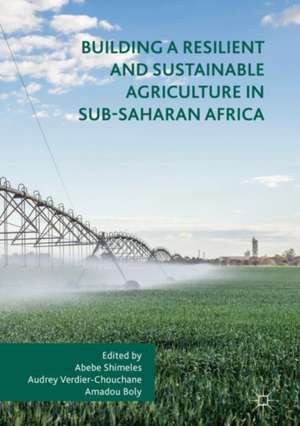Building a Resilient and Sustainable Agriculture in Sub-Saharan Africa
Editat de Abebe Shimeles, Audrey Verdier-Chouchane, Amadou Bolyen Limba Engleză Hardback – 14 iun 2018
What are the challenges and action points for agricultural sustainability in Sub-Saharan Africa? This open access collection of papers offers technical analyses, policy recommendations and an overview of success stories to date. Each carefully selected paper provides valuable insights for improved policy making and defines relevant strategic priorities on Africa’s sustainable transformation process, which is in line with the international development agenda. Although agriculture remains the main source of income for Africa’s population, the sector is rain-fed subjecting it to the vagaries of weather and climate change. This volume demonstrates the rationale of developing a competitive, inclusive and sustainable agribusiness sector for Africa’s food security and structural transformation.
From the impact of Bioenergy crop adoption and Drought Index Insurance to Agro-Industrialization, this volume is important reading for individual researchers, academic associations and professional bodies interested in African agricultural development.
| Toate formatele și edițiile | Preț | Express |
|---|---|---|
| Paperback (1) | 222.63 lei 43-57 zile | |
| Springer International Publishing – 8 ian 2019 | 222.63 lei 43-57 zile | |
| Hardback (1) | 234.94 lei 43-57 zile | |
| Springer International Publishing – 14 iun 2018 | 234.94 lei 43-57 zile |
Preț: 234.94 lei
Nou
Puncte Express: 352
Preț estimativ în valută:
44.96€ • 47.06$ • 37.42£
44.96€ • 47.06$ • 37.42£
Carte tipărită la comandă
Livrare economică 31 martie-14 aprilie
Preluare comenzi: 021 569.72.76
Specificații
ISBN-13: 9783319762210
ISBN-10: 3319762214
Pagini: 286
Ilustrații: XXVIII, 302 p. 25 illus., 19 illus. in color.
Dimensiuni: 148 x 210 x 20 mm
Greutate: 0.69 kg
Ediția:1st ed. 2018
Editura: Springer International Publishing
Colecția Palgrave Macmillan
Locul publicării:Cham, Switzerland
ISBN-10: 3319762214
Pagini: 286
Ilustrații: XXVIII, 302 p. 25 illus., 19 illus. in color.
Dimensiuni: 148 x 210 x 20 mm
Greutate: 0.69 kg
Ediția:1st ed. 2018
Editura: Springer International Publishing
Colecția Palgrave Macmillan
Locul publicării:Cham, Switzerland
Cuprins
Chapter 1: Understanding the Challenges of the Agriculture Sector in Sub-Saharan Africa.- Part I – Improving Agricultural Productivity.- Chapter 2: Improved Seeds and Agricultural Productivity of Family Farms in Cameroon.- Chapter 3: Breaking the Traditional Trap: Assessing Drivers of Modern Technology Adoption by Smallholder Farmers in Hurungwe District, Zimbabwe.- Chapter 4: Input Utilization and Agricultural Labour Productivity: A Gender Analysis.- Chapter 5: Evaluation of Women’s On-Farm Trial of Drought Tolerant Maize in Southern Guinea Savannah Agro-Ecological Zone of Nigeria.- Chapter 6: Impact of Bioenergy Crop Adoption on Total Crop Incomes of Farmers in Northern Ghana: The Case of Jatropha Curcas.- Part II - Addressing Climate Change Challenges.- Chapter 7: Profitability in a Sustainable Agricultural Production System: An Approach by the Soil and Water Conservation.- Chapter 8: Land Tenure and Communities’ Vulnerability to Climate Shocks: Insights from the Niger Basin of Benin.- Chapter 9: Impact of Drought Index Insurance on Supplemental Irrigation: A Randomized Controlled Trial Experimental Evidence in Northern Ghana.- Part III – Promoting Agro-Industrialization.- Chapter 10: Does the Development of the Agricultural Sector Affect the Manufacturing Sector?.- Chapter 11: Transforming African Agriculture through Special Economic Zones: Opportunities and Challenges.- Chapter 12: Global Value Chains and Upmarket of ECOWAS countries.- Chapter 13: Enhancing the Resilience and Sustainability of the Agriculture Sector in Sub-Saharan Africa.
Notă biografică
Abebe Shimeles is Acting Director of the Macroeconomic Policy, Forecasting and Research Department at the African Development Bank. Previously, Shimeles has worked for The World Bank, UNECA, ACTIONAID and Addis Ababa University, Ethiopia, in different capacities. His recent research interests include labour market integration, migration issues in Africa and impact evaluation of policy interventions. He holds a PhD in Economics from University of Gothenburg, Sweden, an MSc from Delhi School of Economics, India, and a BSc in Economics from Addis Ababa University, Ethiopia.
Audrey Verdier-Chouchane is Chief Research Economist at the African Development Bank. Prior to joining the African Development Bank, Verdier-Chouchane taught Macroeconomics and Development Economics at the University of Nice Sophia Antipolis, France, from where she holds a PhD in Economics. She has mainly published on the analysis and measurement of poverty and inequalities witha special focus on gender disparity and labor market issues for the youth.
Amadou Boly is Principal Research Economist at the African Development Bank. His research interests are in development and experimental economics, and his articles have been published in leading international journals. Previously, Boly worked for UNU-WIDER (2014-2015, Finland); and UNIDO (2009-2014, Austria), mainly in technical assistance and global forum activities related to industrial statistics and industrial policy. He holds a PhD in economics from the University of Montreal, Canada, an MSc in International Business from the University of Groningen, The Netherlands, and a BSc in Economics and Management from the University of Ouagadougou, Burkina Faso.
Textul de pe ultima copertă
This book is open access under a CC BY 4.0 license
What are the challenges and action points for agricultural sustainability in Sub-Saharan Africa? This collection of papers offers technical analyses, policy recommendations and an overview of success stories to date. Each carefully selected paper provides valuable insights for improved policy making and defines relevant strategic priorities on Africa’s sustainable transformation process, which is in line with the international development agenda. Although agriculture remains the main source of income for Africa’s population, the sector is rain-fed subjecting it to the vagaries of weather and climate change. This volume demonstrates the rationale of developing a competitive, inclusive and sustainable agribusiness sector for Africa’s food security and structural transformation.
From the impact of Bioenergy crop adoption and Drought Index Insurance to Agro-Industrialization,this volume is important reading for individual researchers, academic associations and professional bodies interested in African agricultural development.
Caracteristici
Promotes knowledge management as an important driver of policy dialogue, good policy planning and implementation Fosters dialogue that promotes the exchange of ideas and innovative thinking among researchers, development practitioners and African policymakers Encourages and enhances research on economic and policy issues related to the development of African economies
